 A look inside the Human Neuroscience Institute and research led by professor Valerie Reyna on human decision making. Read more
A look inside the Human Neuroscience Institute and research led by professor Valerie Reyna on human decision making. Read more

 A look inside the Human Neuroscience Institute and research led by professor Valerie Reyna on human decision making. Read more
A look inside the Human Neuroscience Institute and research led by professor Valerie Reyna on human decision making. Read more
Understanding why college students check Facebook so often and whether the stigma of having a father in jail affects elementary school teachers’ expectations of students are just two of many questions social scientists are exploring using research grants awarded last month by theInstitute for the Social Sciences.
Twice yearly, the ISS provides up to $12,000 to social science faculty for research. Priority is given to projects led by tenure-track faculty early in their careers.
Natalya Bazarova, assistant professor in communication, is seeking to understand the gratification and psychological mechanisms, including motivating factors and habit, that drive young adults to check Facebook so frequently.
Christopher Wildeman, associate professor of policy analysis and management, expects that his study working with 300 elementary school teachers – using a research design that manipulates the paternal incarceration status of fictional students – may have implications for policy interventions.
Elaine Wethington, professor in human development and sociology, says: “Little is known about the quality of older couples’ marital relationships and the formation and dissolution of their romantic and sexual relationships." Her research, which focuses on people over age 50, looks at marital quality compared across different age cohorts, the emotional and financial consequences of de-coupling in later life, living arrangements among those who divorced after 50, and the formation of new sexual and romantic relationships in later life.
Sarah Kreps, associate professor of government, is examining the reasons why Americans support humanitarian intervention to promote the welfare of foreign citizens from man-made violence.
Shannon Gleeson, associate professor in labor relations, law and history, explores the collaborations that labor unions, immigrant rights organizations, worker centers and legal-aid groups in the United States have with the Mexican Consulate to enforce workplace rights of immigrant workers.
How do different kinds of experts and organizations in the electric power sector manage the diverse risks – including cyber-attacks, power outages and environmental harm – associated with a “smart” electrical grid? This is a question Rebecca Slayton, assistant professor in science and technical studies, seeks to answer.
To understand the cognitive process guiding environmental preferences, Ricardo Daziano, assistant professor in the School of Civil and Environmental Engineering, will have 600 adults living in New York City complete a Web-based survey of consumers’ willingness to pay to reduce carbon emissions.
By collecting data from college students and their summer internship employers, Poppy McLeod, associate professor, and Alicia Orta-Ramirez, senior lecturer, both in communication, hope to answer the question: “How do students’ campus-based teamwork experiences relate to demonstration of teamwork and other interpersonal skills in the workplace?”
Sofia Villenas, associate professor in anthropology, investigates teaching and learning about racial justice, equity and citizenship that occurs outside traditional classroom settings at festivals, protests and community forums to better understand how adults and youths learn about civics and democratic participation.
A research team led by Chris Barrett, the David J. Nolan Director of the Dyson School of Applied Economics and Management, and funded by the World Bank is examining whether irrigation project improvements and changing water condition stemming from climate change prompt farmers in Nepal to be more receptive to agricultural extension services. The ISS grant will fund the team’s travel.
Assistant Professor Ortiz-Bobea in the Dyson School is using historic French statistical agricultural yearbooks to analyze how government regulation contributed to the emergence of a higher-quality market for wine.
Working with coffee growers in the Popayán region of Colombia, Arnab Basu and Miguel Gómez, professors in the Dyson School, are trying to understand how membership-based organizations affect an individual member’s risk and time preferences and the propensity to trust.
Julieta Caunedo, assistant professor of economics, is using sale and auction price data on used agricultural equipment to help explain how countries adopt new technologies in the agricultural sector. Her work is co-funded by the President’s Council of Cornell Women.
Since the ISS small grant program began in 2005, more than 200 projects have received support. Applications for spring 2015 ISS grants are due Feb. 3, 2015.
Lori Sonken is the staff writer for the Institute for the Social Sciences.
Reprinted from Cornell Chronicle, November 4, 2014
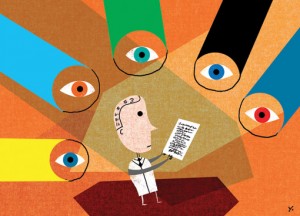 A proposal for research to detect racial bias in the research peer review process has earned a second-place prize from the National Institutes of Health’s Center for Scientific Review (CSR) for two College of Human Ecology faculty members: Wendy M. Williams and Stephen J. Ceci.
A proposal for research to detect racial bias in the research peer review process has earned a second-place prize from the National Institutes of Health’s Center for Scientific Review (CSR) for two College of Human Ecology faculty members: Wendy M. Williams and Stephen J. Ceci.
NIH sponsored the national “Great Ideas” contest in response to recent findings that African-American principal investigators have a 10.4 percent lower funding rate on NIH grant proposals. The goal was to encourage the development of novel approaches to study and understand the mechanisms leading to the black funding deficit, as well as ways to address the issue.
The professors of human development outlined experiments to answer the question: Do investigator race and/or ethnicity of topic target population (considered separately as well as together) influence research evaluations? “By better understanding why and under what conditions reviewers assign lower scores to grants by African-American PIs, we can target solutions to ensure optimal impact of resources for solving the problem and eliminating inequalities in the grant-review process,” Williams and Ceci wrote.
Williams and Ceci were awarded a cash prize of $5,000 for their “Great Idea.”
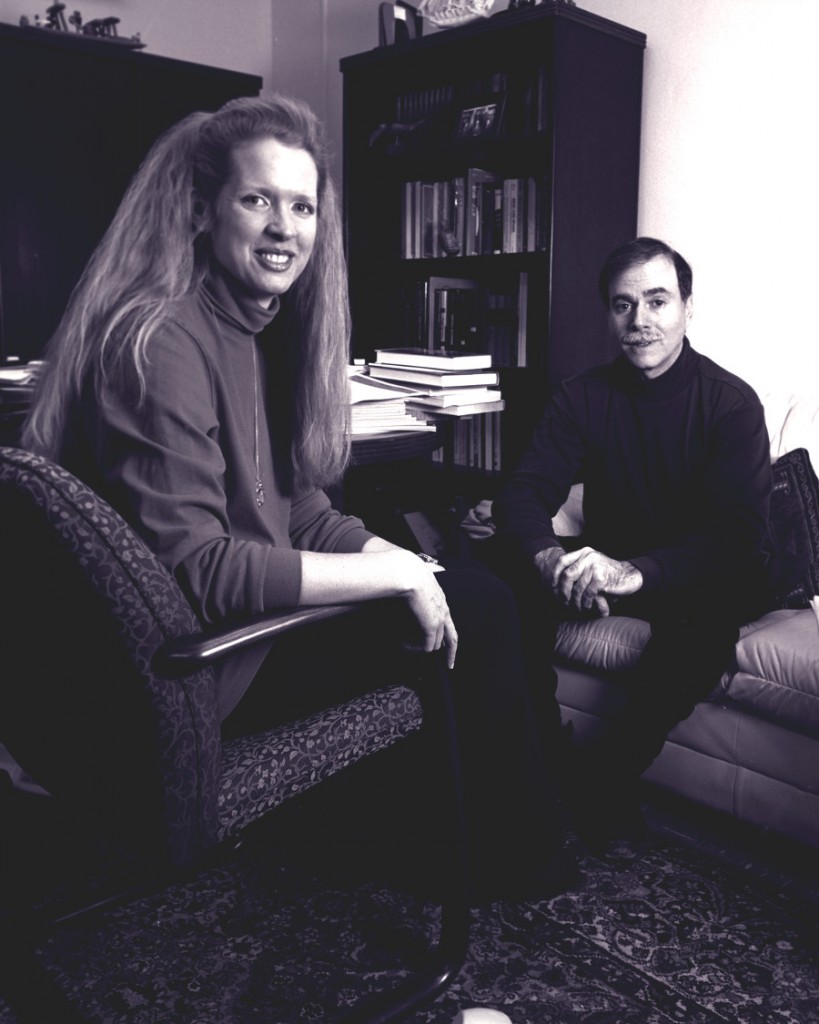 Until recently, universities deserved their reputations as bastions of male privilege and outright sexism say Cornell professors Steve Ceci and Wendy Williams in their recent New York Times op-ed piece. But times have changed. Many of the common, negative depictions of the plight of academic women are based on experiences of older women and data from before the 2000s, and often before the 1990s. That’s not to say that mistreatment doesn’t still occur — but when it does, it is largely anecdotal, or else overgeneralized from small studies. They found that when the evidence of mistreatment goes beyond the anecdotal, it is limited to a small number of comparisons of men and women involving a single academic rank in a given field on a specific outcome. Read more
Until recently, universities deserved their reputations as bastions of male privilege and outright sexism say Cornell professors Steve Ceci and Wendy Williams in their recent New York Times op-ed piece. But times have changed. Many of the common, negative depictions of the plight of academic women are based on experiences of older women and data from before the 2000s, and often before the 1990s. That’s not to say that mistreatment doesn’t still occur — but when it does, it is largely anecdotal, or else overgeneralized from small studies. They found that when the evidence of mistreatment goes beyond the anecdotal, it is limited to a small number of comparisons of men and women involving a single academic rank in a given field on a specific outcome. Read more
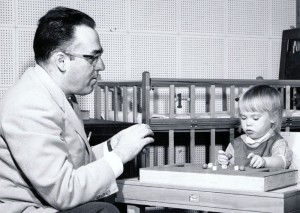 For more than 50 years as a faculty member in Human Development, Henry N. Ricciuti was a leader in his field, a powerful advocate for families and youth, a nurturing teacher, and a mentor to fellow professors. Henry's accomplishments were numerous, leading the Society for Research in Child Develpment to honor him in 2001 with its lifetime award for Distinguished Contributions to Public Policy for Children. His approach to research questions was inherently ecological, long before that adjective came into broad use among developmental psychologists. Read the full story
For more than 50 years as a faculty member in Human Development, Henry N. Ricciuti was a leader in his field, a powerful advocate for families and youth, a nurturing teacher, and a mentor to fellow professors. Henry's accomplishments were numerous, leading the Society for Research in Child Develpment to honor him in 2001 with its lifetime award for Distinguished Contributions to Public Policy for Children. His approach to research questions was inherently ecological, long before that adjective came into broad use among developmental psychologists. Read the full story
Qi Wang, professor of human development, is quoted in the Dallas Morning News, September 14: "childhood memories have a long-lasting impact on how we behave," lending support to a new study finding that children who frequently wait in line are more likely to become impulsive spenders as adults. Read more
Valerie Reyna's new study investigating alternative interventions to nudge adolescents toward safer behavior was featured in the online forum Big Think. Results of the study suggest that teaching students the “gist” of how to act in a given situation is significantly more effective than just giving them the tools to weigh risks using their own powers of rationality. Read more
Valerie Reyna, professor of human development in Cornell's College of Human Ecology commented recently on the rising fear of Ebola in the United States for the PBS News Hour, the Huffington Post, and for the Cornell Press.
“The layperson’s perception of risk from Ebola is understandable from a psychological perspective. People often think in terms of categorical possibilities—especially about horrifying possibilities. They are told that transmission is categorically impossible, then the impossible happens--twice. Two healthcare workers get infected. Suddenly, the impossible becomes possible and people are naturally fearful."
“It is crucial to understand the public’s perception of risk as an integral part of public health efforts to control infections, whether those infections are HIV, HPV and its vaccine, or Ebola. The science of human perception and behavior cannot be ignored because it is a key part of keeping the nation safe.”
For PBS newshour, October 16, 2014, she elaborated: "now, psychologically, people have shifted from, this is an impossibility to, not only is it a possibility, but it’s one that’s increasing. And the human mind is keenly attuned to change, to increases in risk, as well as changes from impossible to possible."
Fear actually spreads from person to person similarly to how a physical virus is transmitted, Reyna said in her interview with Huffington Post, October 17, 2014. And if a risk is unfamiliar to us -- something that we've never experienced and may not understand the actual of level of risk associated -- it tends to produce more dread, says Reyna.
Related Link:
By Ted Boscia
Reprinted from Cornell Chronicle, June 9, 2014
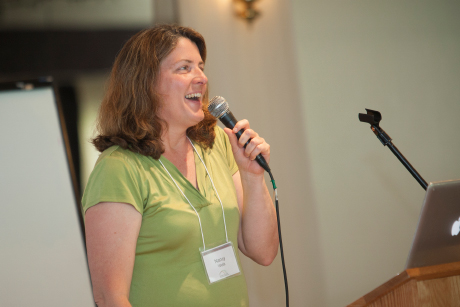
Nancy Wells, associate professor of design and environmental analysis, speaks at the event June 3. Photo by Lindsay France/University Photography
Do school gardens influence kids’ diet and physical activity? Does hip-hop belong in the classroom? How can teens use Facebook, Twitter, Snapchat and other social media responsibly?
Cornell faculty experts addressed these and other questions for nearly 50 Cornell Cooperative Extension (CCE) county leaders, 4-H educators and community partners at the fourth annual Youth Development Research Update, June 3-4 in Ithaca. Sponsored by the Bronfenbrenner Center for Translational Research (BCTR) in the College of Human Ecology, the event joined researchers and practitioners from across New York state to discuss new findings, develop partnerships and identify areas for further research.
“The research update informs practitioners about research-based knowledge they can draw on in their work,” said professor of human development Stephen Hamilton, who co-hosted the event with Jutta Dotterweich, training and technical assistance coordinator for the BCTR’s ACT for Youth Project. “It fosters dialogue that enables researchers to understand what is most important and most useful to practitioners and ultimately for both to find common ground for collaboration.”
To open the conference, Robert Sternberg, professor of human development, shared his current work on ethics. Doing right, he said, ought to be easy, but “it’s actually quite hard.” He presented his theory of eight steps to ethical behavior, progressing from dilemma recognition to action. “At every step there’s the option to check out, any one of which can lead to a failure to act.” Sternberg advised that schools and youth programs integrate ethics into a range of subject matters rather than treating them separately.
Environmental psychologist Nancy Wells, associate professor of design and environmental analysis, detailed her school gardens research, which found that gardens prompted grade-school children to be more physically active in classes and at home.
To show the hazards of teaching hip-hop in schools, Travis Gosa, assistant professor of Africana studies in the College of Arts and Sciences, described how a Florida middle school teacher was suspended this year for asking her students to evaluate the literary devices used in a violent, sexually explicit rap song. Despite this, Gosa, who is writing a book on hip-hop-based education, said such music and culture can be taught responsibly, “in a way that reflects an understanding of the history and politics of hip-hop and its impression on young people.”
Social media presents another minefield for young people, said Natalya Bazarava, assistant professor of communication. Teens often share intimate information without weighing the consequences, her studies have found, and she advised teaching youth about the Internet’s wide and lasting reach.
To conclude, Lorraine Maxwell, associate professor of design and environmental analysis, shared her work on children’s perception of their school environment and its effect on their academic achievement and well-being. Her work found a troubling chain reaction: when students rate the quality of their school facilities poorly, it lowers their perception of the school social climate, leading to decreased attendance and subpar academic performance.
For Tim Davis, 4-H youth development extension issues leader for CCE Ontario County, the conference helps to spark connections with faculty members seeking to test their ideas in the field. At last year’s event, he met Jane Mendle, assistant professor of human development; together they launched a multiyear study of writing interventions for teen girls. He is pursuing research partnerships with three other Cornell professors.
“Often, we are eager to work with professors, and they want to run research in community settings, but that can’t happen without first building a relationship with the faculty member,” Davis said. “This research update gets us talking about the possibilities.”
Ted Boscia is director of communications and media for the College of Human Ecology.
Related Links:
Bronfenbrenner Center for Translational Research
By Scott Goldberg
Reprinted from the Cornell Chronicle, April 23, 2014

Karin Abouelnaga '13 gives the keynote address at the annual Service-Learning Showcase April 17. Photo by Robert Barker/University Photography
“There are a million different problems out there. Every single day in any urban city you walk by, there are people who are homeless, people who are sick. How do you know when you’ve identified the problem that you should be solving?” asked keynote speaker Karim Abouelnaga ’13 at the annual Service-Learning Showcase held on April 17.
Karim, founder of the nonprofit Practice Makes Perfect, emphasized the importance of personal reflection in problem-solving and encouraged the nearly 200 faculty, staff and students in attendance to bridge the gap between their work at Cornell and their passion to make a difference.
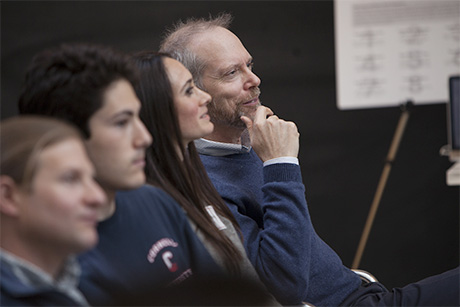
Karl Pillemer, right, listens to the keynote address during the showcase. Photo by Robert Barker/University Photography
Abouelnaga’s address also celebrated those across campus devoted to public engagement locally, nationally and internationally. The address was followed by a ceremony for faculty and student project awards, co-sponsored by Engaged Learning + Research and the Office of Academic Diversity Initiatives. Winning projects received $1,500 to support future community-engagement initiatives; they were selected on their impact on the communities they serve, project sustainability and knowledge dissemination within the Cornell community and beyond.
Kira Gidron ’13, a graduate student in the field of systems engineering, won the Student Excellence in Community-Engaged Learning + Research Award for her work with the Intag Project. The project is a long-term partnership that links community organizations in Intag, Ecuador, with Cornell students through coursework and close collaboration with on-the-ground community partners. As an experiential learning class, it aims to strengthen sustainable and socially just alternatives to open-pit mining in Ecuador through education, outreach and economic development.
The Faculty Excellence in Community Collaboration Award went to professors Karl Pillemer, M. Carrington Reid and Elaine Wethington, who co-direct the Translational Research Institute on Pain in Later Life. The institute brings together dozens of outstanding faculty, staff, students and community partners to improve the health and well-being of older adults through non-pharmacological interventions for chronic pain. Now in its fifth year, the institute benefits communities across New York state and nationally.
The showcase also featured several student projects from the Clinton Global Initiative University (CGI U) Annual Meeting and gave grants totaling $10,000 to outstanding projects. The top CGI U Commitment Award went to Scholars Working Ambitiously to Graduate (SWAG), a group led by students Kendrick Coq ’15, Channing McNeal ’15 and Thaddeus Talbot ’15. SWAG fosters a supportive environment at Cornell to increase black men’s graduation rate to 90 percent by 2015, putting the group on par with the graduation rate of other racial demographics on campus. Honorable mentions went to Alexon Grochowski ’15, Joseph Nelson ’14 and Ralph-Cedric Comeau ’16 for Inclusive School Haiti; Timothy Smith ’14 for The Bekondo Project; and Angela Han ’15 for Project STAR: Celebrating Women.
The event also featured graduate student Meredith Ramirez Talusan’s “Keep Your Hat On” photography exhibit, which identifies Cornellians across disciplines that engage in social innovation and entrepreneurship. A total of 42 groups presented at the showcase.
Scott Goldberg ’16 is a student intern writer for the Cornell Chronicle.
Related Links:
Service-Learning Showcase
Bekondo Foundation